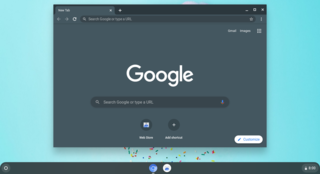| Developer | Jacob Cook |
|---|---|
| OS family | Linux (Unix-like) |
| Working state | Discontinued |
| Source model | Open source |
| Latest release | 0.8.1 / October 19, 2016 |
| Available in | English |
| Package manager | pacman |
| Platforms | ARM |
| Support status | |
| Discontinued | |
arkOS was a Linux distribution based on Arch Linux, designed primarily for hosting web sites and services on cheap ARM-based devices such as Raspberry Pi, Cubieboard 2, Cubietruck or BeagleBone Black, with plans to expand to other platforms such as x86. [1] [2] [3] [4] It was in operation from 2014 to 2017.
Jacob Cook, arkOS' primary developer, originally conceived the idea of arkOS after realizing the extensive amount of time it required to set up his own self-hosted services. He explained it by saying: "I had a good deal of experience with Linux and system administration, but it still took a huge amount of time and research to get the services I wanted set up, and secured properly." [5] Cook aims to reduce dependence from cloud services and make data collection harder. [6]
As of March 2014, arkOS was in its developing stages. The creator of arkOS had also set up CitizenWeb organization, [7] which was responsible for the development of the operating system. CitizenWeb also solicited money through a successful crowdsourcing campaign to finish the platform. [8]
In April 2017 arkOS was discontinued, [9] with the lack of resources as the principal reason. [10] The source code remains available on GitHub. [11]

A free and open-source graphics device driver is a software stack which controls computer-graphics hardware and supports graphics-rendering application programming interfaces (APIs) and is released under a free and open-source software license. Graphics device drivers are written for specific hardware to work within a specific operating system kernel and to support a range of APIs used by applications to access the graphics hardware. They may also control output to the display if the display driver is part of the graphics hardware. Most free and open-source graphics device drivers are developed by the Mesa project. The driver is made up of a compiler, a rendering API, and software which manages access to the graphics hardware.

LXDE is a free desktop environment with comparatively low resource requirements. This makes it especially suitable for use on older or resource-constrained personal computers such as netbooks or system on a chip computers.
Linux-based operating systems can be used for playing video games. Because many games are not natively supported for the Linux kernel, various software has been made to run Windows games, such as Wine, Cedega, and Proton, and managers such as Lutris and PlayOnLinux. The Linux gaming community has a presence on the internet with users who attempt to run games that are not officially supported on Linux.

Midori is a free and open-source web browser. In 2019, the Midori project merged with the Astian Foundation, then Midori Browser, switching from WebKitGTK to using Gecko and Floorp browser.

ChromiumOS is a free and open-source operating system designed for running web applications and browsing the World Wide Web. It is the open-source version of ChromeOS, a Linux-based operating system made by Google.

Raspberry Pi is a series of small single-board computers (SBCs) developed in the United Kingdom by the Raspberry Pi Foundation in association with Broadcom. Since 2013, Raspberry Pi devices have been developed and supported by a subsidiary of the Raspberry Pi Foundation, now named Raspberry Pi Ltd. The Raspberry Pi project originally leaned toward the promotion of teaching basic computer science in schools. The original model became more popular than anticipated, selling outside its target market for diverse uses such as robotics, home and industrial automation, and by computer and electronic hobbyists, because of its low cost, modularity, open design, and its adoption of the HDMI and USB standards.

Firefox OS is a discontinued open-source operating system – made for smartphones, tablet computers, smart TVs, and dongles designed by Mozilla and external contributors. It is based on the rendering engine of the Firefox web browser, Gecko, and on the Linux kernel. It was first commercially released in 2014.

elementary OS is a Linux distribution based on Ubuntu LTS. It promotes itself as a "thoughtful, capable, and ethical" replacement to macOS and Windows and has a pay-what-you-want model. The operating system, the desktop environment, and accompanying applications are developed and maintained by elementary, Inc.

The Xojo programming environment and programming language is developed and commercially marketed by Xojo, Inc. of Austin, Texas for software development targeting macOS, Microsoft Windows, Linux, iOS, Android, the Web and Raspberry Pi. Xojo uses a proprietary object-oriented language.

Raspberry Pi OS is a Unix-like operating system based on the Debian GNU/Linux distribution for the Raspberry Pi family of compact single-board computers. First developed independently in 2012, it has been produced as the primary operating system for these boards since 2013, distributed by the Raspberry Pi Foundation.
Docker is a set of platform as a service (PaaS) products that use OS-level virtualization to deliver software in packages called containers. The service has both free and premium tiers. The software that hosts the containers is called Docker Engine. It was first released in 2013 and is developed by Docker, Inc.
Besides the Linux distributions designed for general-purpose use on desktops and servers, distributions may be specialized for different purposes including computer architecture support, embedded systems, stability, security, localization to a specific region or language, targeting of specific user groups, support for real-time applications, or commitment to a given desktop environment. Furthermore, some distributions deliberately include only free software. As of 2015, over four hundred Linux distributions are actively developed, with about a dozen distributions being most popular for general-purpose use.
bhyve is a type-2 hypervisor initially written for FreeBSD. It can also be used on a number of illumos based distributions including SmartOS, OpenIndiana, and OmniOS. A port of bhyve to macOS called xhyve is also available.

Intel Galileo is the first in a line of Arduino-certified development boards based on Intel x86 architecture and is designed for the maker and education communities. Intel released two versions of Galileo, referred to as Gen 1 and Gen 2. These development boards are sometimes called "Breakout boards".
Vulkan is a low-level low-overhead, cross-platform API and open standard for 3D graphics and computing. It was intended to address the shortcomings of OpenGL, and allow developers more control over the GPU. It is designed to support a wide variety of GPUs, CPUs and operating systems, it is also designed to work with modern multi-core CPUs.
Pine Store Limited, known by its trade name Pine64, is a Hong Kong-based organization that designs, manufactures, and sells single-board computers, notebook computers, as well as smartwatch/smartphones. Its name was inspired by the mathematical constants pi and e with a reference to 64-bit computing power.
Puffin Browser is a remote browser developed by CloudMosa, an American mobile technology company founded by Shioupyn Shen.

Home Assistant is free and open-source software for home automation designed to be an Internet of things ecosystem-independent integration platform and central control system for smart home devices, with a focus on local control and privacy. It can be accessed through a web-based user interface, by using companion apps for Android and iOS, or by voice commands via a supported virtual assistant, such as Google Assistant or Amazon Alexa, and their own "Assist".

Collabora Online is an open source online office suite built on LibreOffice Technology, enabling web-based collaborative real-time editing of word processing documents, spreadsheets, presentations, and vector graphics. Optional apps are available for desktops, laptops, tablets, smartphones, and Chromebooks.
Twister OS is a 32-bit Operating System created by Pi Labs for the Raspberry Pi single board computer originally, with a x86_64 PC version released a few months later. Twister is meant to be a general-purpose OS that is familiar or nostalgic to users. Twister is based on Raspberry Pi OS Lite and uses the XFCE desktop environment. Twister OS also has a version called "Twister OS Armbian" designed for ARM SBCs with the RK3399 CPU. There are four versions of the operating system, TwisterOS Full, Twister OS Lite, Twister UI and Twisters OS Armbian.